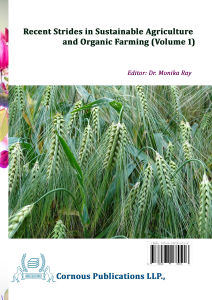Water is one of the critical agricultural resources for crop growth, crop yield and livestock health. Suitable water management methods help farmers to conserve water, improve irrigation efficiency and reduces waste. Organic farmers highly depend on rainfall or ground water resource to water their crops as irrigation source. The available water resources for agriculture should be utilized very cautiously in the farm. In organic agriculture water in terms of soil moisture play major roles in plant nutrition. Growth and multiplication of microbes much rely on adequate soil moisture which could be achievable through efficient water management technologies. Micro irrigation has potential to apply bio inputs viz., panchagavya, amirthakaraisal, jeevamirtham etc., through irrigation which increase the microbial activity in soil and improve soil fertility eventually growth and yield of the crop under organic farming.
Water management, liquid organic fertilizers, soil and water conservation
Brouwer, C., Prins, K., Kay, M. & Heibloem, M. 1988. Irrigation methods. In: Irrigation water management training manual No. 5. FAO, Rome, Italy. https://www.fao.org/4/S8684E/s8684e00.htm
